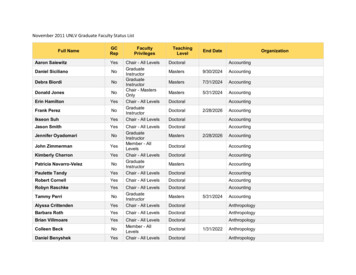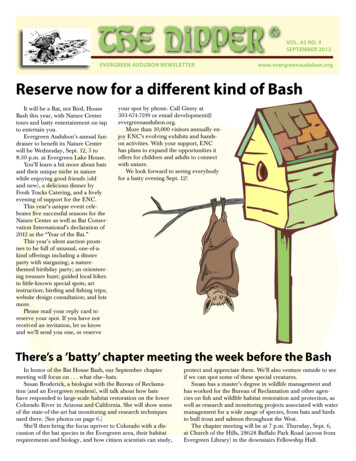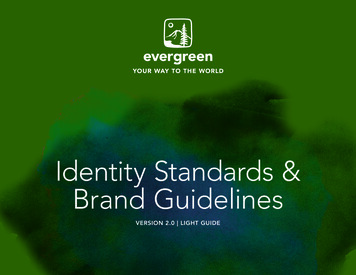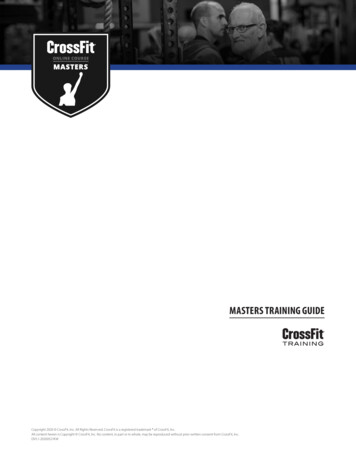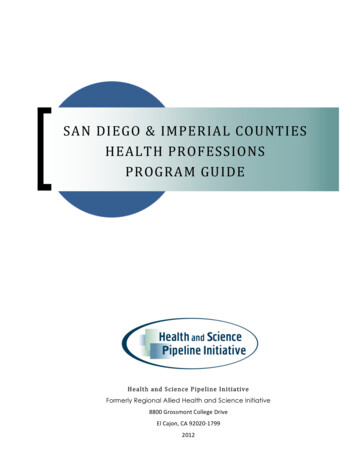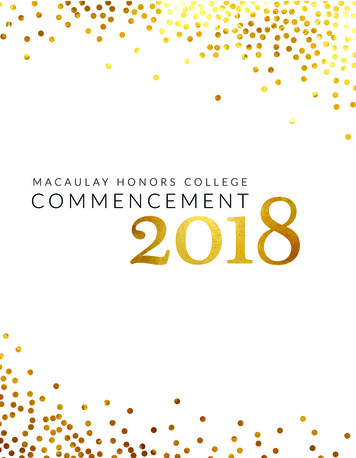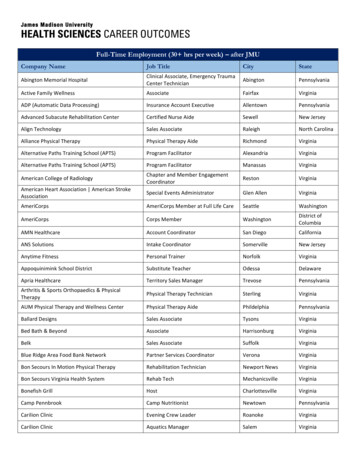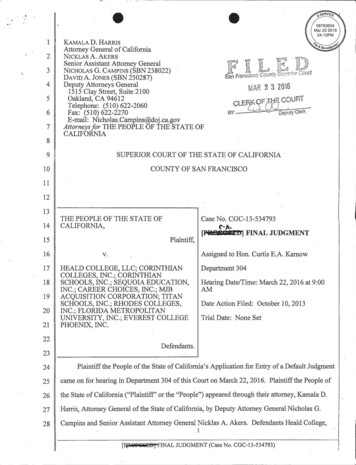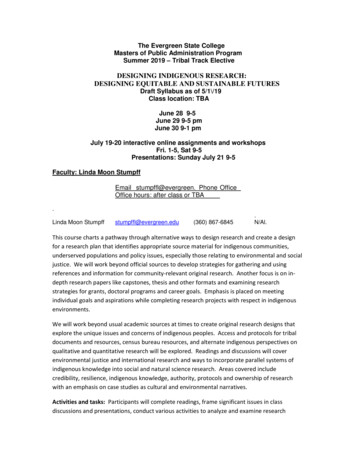
Transcription
The Evergreen State CollegeMasters of Public Administration ProgramSummer 2019 – Tribal Track ElectiveDESIGNING INDIGENOUS RESEARCH:DESIGNING EQUITABLE AND SUSTAINABLE FUTURESDraft Syllabus as of 5/1\/19Class location: TBAJune 28 9-5June 29 9-5 pmJune 30 9-1 pmJuly 19-20 interactive online assignments and workshopsFri. 1-5, Sat 9-5Presentations: Sunday July 21 9-5Faculty: Linda Moon StumpffEmail stumpffl@evergreen. Phone OfficeOffice hours: after class or TBA.Linda Moon Stumpffstumpffl@evergreen.edu(360) 867-6845.N/Al.This course charts a pathway through alternative ways to design research and create a designfor a research plan that identifies appropriate source material for indigenous communities,underserved populations and policy issues, especially those relating to environmental and socialjustice. We will work beyond official sources to develop strategies for gathering and usingreferences and information for community-relevant original research. Another focus is on indepth research papers like capstones, thesis and other formats and examining researchstrategies for grants, doctoral programs and career goals. Emphasis is placed on meetingindividual goals and aspirations while completing research projects with respect in indigenousenvironments.We will work beyond usual academic sources at times to create original research designs thatexplore the unique issues and concerns of indigenous peoples. Access and protocols for tribaldocuments and resources, census bureau resources, and alternate indigenous perspectives onqualitative and quantitative research will be explored. Readings and discussions will coverenvironmental justice and international research and ways to incorporate parallel systems ofindigenous knowledge into social and natural science research. Areas covered includecredibility, resilience, indigenous knowledge, authority, protocols and ownership of researchwith an emphasis on case studies as cultural and environmental narratives.Activities and tasks: Participants will complete readings, frame significant issues in classdiscussions and presentations, conduct various activities to analyze and examine research
strategies, prepare bibliographies for major papers and develop potential research strategiesappropriate to indigenous and underserved populations with respect for peoples’ rights andsocial justice. The second weekend includes online interactivities to include peer reviewing,designing and developing approaches. All assignments are to be posted on Canvas.Learning Objectives1.2.3.4.5.Examine, explore, evaluate and access indigenous-based resources for researchUnderstand the role of the research in indigenous researchExamine research strategies and evaluate and develop a research design.Examine opportunities for graduate research.Gain an understanding of and ability to apply indigenous methods to qualitative andquantitative researchREADINGSNote: you can choose reading number 4 or 5: both are not required1. Peters, Robert L. (1997) Getting What You Came For: a smart graduate student’s guideFarrar Straus and Giroux NY Chapters 10, 11, 12, 16-18, 21, 232. Guidelines for Considering Traditional Knowledges in Climate Change Initiatives(posted on Canvas) Workgroup: Carlotta Chief et al3. Kimmerer, Robin Wall (2013) Braiding Sweetgrass: indigenous wisdom, scientificknowledge and the teaching of plants Milkweed Editions Minneapolis, Minn.ISBN 978-1-57131-356-04. Walters, Maggie and Chris Andersen (2013) Indigenous Statistics: AQuantitative Research Methodology Routledge, Taylor and Frances Group, Londonand New York ISBN 978 16113229345. Lambert, Lori (2014) Research for Indigenous Survival: indigenous researchmethods in the behavioral sciences Salish Kootenai College PressISBN 13 978-1934594124Additional required reading for graduate credit only:6. Mertens, Donna M, Fiona Cram and Bagele Chilisa eds. (2013) Pathways intoSocial Research: voices of a new generationRoutledge NY ISBN 978-1-159874696-97. Articles (2) on participatory research and indigenous science (to be posted onCanvas)
Additional Non-Required Resources1. Barrow, John, “Recovering Canada: The Resurgence of Indigenous Law”, 2002,Toronto, University of Toronto Press, paper ISBN: 0-8020-8501-6 or hardback ISBN:0-8020-3679. Ch 1,4 , 6, and 8 plus “Philosopher’s Walk” section at the end2. Wildcat, David (2009) Red Alert Fulcrum Publishing ISBN 13 978-15559163743. Cajete, Gregory Native Science: Natural Laws of Interdependence (any edition)Clear Light Publishing, Santa Fe NM ISBN 13 978-1574160413 or4. Cajete, Gregory ( 1999) A Peoples’ Ecology: explorations in sustainable livingClearlight Publishing, Santa Fe NM ISBN13 978-1555916374Resource Websites:1. National Congress of American Indians ncai.org2. Native American Rights Fund narf.org3. American Indigenous Research rg4. Institute for Tribal Environmental Professionals www7.nau.edu/itep/main/Home5. Alaska Native Knowledge Network www.ankn.uaf.eduExpectationsStudents Attend every class; be on time. Participation includes speaking in class, listening toothers, taking notes, completing class interactive exercises, and listening to and dialogingwith the guest speakers. If an absence is unavoidable, seminar faculty must be notifiedprior to a class and/or seminar absence. After one absence per quarter, make-up workmay be assigned at faculty discretion, on a case-by-case basis. Makeup work must becompleted by the end of the quarter in question to ensure full receipt of course credit. Comply with TESC Student Conduct Code: student conduct code. Writing is expected to be of the highest quality, clear with accurate grammar and spelling.Students are encouraged, and may be required, to work with the Graduate WritingAssistant. Students will receive 4 credits at the completion of each quarter if all course requirementshave been satisfactorily completed to meet course objectives. Credit denial decisions willbe made by the faculty. Denial of credit for two terms of core may result in expulsion fromthe MPA program. Plagiarism (i.e., using other peoples’ work as your own), failing tocomplete one or more assignments, completing one or more assignments late (withouthaving made arrangements before the due date), or multiple absences may constitutedenial of total credit. Unexcused absences or lack of academic work may result in nocredit at the discretion of the faculty. Students will also be evaluated based upon theirprogress towards the learning goals that will be assessed from classroom, seminar, andassignment performance. The faculty team makes decisions for no credit whennecessary, based on absence or failure to meet academic course requirements. Students are required to have an Evergreen e-mail account for communication aboutclass work and to participate in program list serves and Canvas. Computer and Internet access are required to complete course work outside of class.
Cell phones may be on but ringers need to be off during seminars and presentations.Topics we discuss may be controversial, with people holding different opinions onrespective subjects. Therefore, having respect for others is fundamental to having open,educational dialogue.Written self-evaluations and seminar faculty evaluations are required for credit, at the endof each quarter, and will be discussed along with faculty evaluations of students at theevaluation conference. (Students may elect to submit faculty evaluations to ProgramSecretaries)Reflect upon, integrate, and demonstrate learning in class participation and inassignments.CANVAS postings of all assignments should be submitted on respective due dates.Students are expected to take advantage of College resources to maintain academicstandards.Faculty Faculty members are expected to conform to the expectations above, as appropriate, beprepared for class, responsive to student questions, and to promptly return student work. Faculty members can be expected to be reasonably available to students.AssignmentsAll assignments must be submitted on time. Late submission of assignments may be acceptedupon prior approval from faculty. Completing readings and assignments is key to getting benefitfrom this courseTurn in a paper copy on the assignment due date to your seminar faculty. Some assignmentsmust be posted on Canvas.Seminar papers. Write seminar papers for required readings and post on Canvas. Use thesame format required during fall quarter—only this time you will be writing one paper for twobooks with the added challenge of contrasting or integrating the ideas. The class Canvas sitewon’t appear until January and it may be January by the time books arrive in the bookstore. Ifyou are able to obtain books online or from other sources, we encourage you to beginreading early in May and June. All assignments are to be posted on CANVASReference and literature review papers for research designs. Topic one: this paper will bea practice on a topic chosen in class as a practice in finding relevant resources. Topic twocan be chosen as an actual possible capstone or thesis topic. .1. Due June 28 Seminar paper:“Getting What you Came For” Chapters 10-12, 16-18, 21, 233. Due June 29 Seminar paper: Choose reading # 4 (Walters and Anderson) or #3(Lambert). Discuss your selected reading from the point of view of how to developresearch questions for indigenous peoples Read only: Guidelines for IndigenousKnowledges and Climate Change (Chief, et al)4. Due June 30 Choose a research topic---select a topic and identify at least six credibleresources for the topic and a design for obtaining additional resources This may becompleted by individuals or teams of two5. Due June 30 Seminar paper: Robin Kimmerer “Braiding Sweetgrass”6. Due July 10 Posted to Canvas Literature review for research topic: 20 or moreresources with narrative for graduate level: 10 or more resources with narrative for
undergraduate credit. This may be completed by teams of two Read two other reviewsand comment online7. Due July 15 Seminar paper: Research articles(2) plus Cajete reading (posted onCanvas) (grad students only)8.Due: July 20 Final research design with literature review (graduate)Due: July 20 Final research design with references (undergraduate)9.Due July 21 Presentation on final research design.
3. Kimmerer, Robin Wall (2013) Braiding Sweetgrass: indigenous wisdom, scientific knowledge and the teaching of plants Milkweed Editions Minneapolis, Minn. ISBN 978-1-57131-356- 4. Walters, Maggie and Chris Andersen (2013) Indigenous Statistics: A Quantitative Research Methodology Routledge, Taylor and Frances Group, London

